Burgess Meredith: Much More than a Character Actor
Burgess Meredith was an American actor best known for playing Mickey Goldmill, Rocky Balboa’s trainer, in the Rocky movies and the Penguin in the Batman TV series. The 5’5-1/2″ actor also gained a new group of fans when he played the father of Jack Lemmon’s character in Grumpy Old Men (1993) and Grumpier Old Men (1995), his last movie role. In addition to the 182 acting credits on his IMDB profile, Meredith was a director in theater, movies, and TV shows. He was excellent in both dramatic as well as comedic roles, and his rugged appearance and gravelly voice made it easy for him to play heroes and bad guys equally well.
Oliver Burgess “Buzz” Meredith was born in Cleveland, Ohio, on November 16, 1907. He started performing in elementary school, perhaps to overcome shyness or escape temporarily from a childhood he recalled as unhappy. After leaving Amherst College before graduating, he tried his hand at various occupations. As a member of a tramp steamer crew, Meredith spent some time in the brig. He passed the time by reciting lines from whatever came to mind. Legend has it that’s what inspired him to pursue acting. Moving to New York City, Meredith debuted on Broadway in a 1930 production of Romeo and Juliet. He returned to the stage many times during the 1930s for shows like “Siegfried,” “Alice in Wonderland” and “Threepenny Opera”, refining his talents through diligent work with Eva Le Gallienne’s theater company. The 1935-36 production of “Winterset,” about a son who tries to prove his dead father wasn’t guilty of murder, put him on the map. Maxwell Anderson, who wrote the play, insisted that Meredith play the main role and the show won the New York Drama Critics Award.
As with the stage version, it was the 1936 movie version of “Winterset” that started Meredith’s career in movies. He also garnered high praise for his performance in the role of George Milton, best friend and guardian of Lennie Small (Lon Chaney, Jr.) in the now classic film version of John Steinbeck’s “Of Mice and Men” (1939).
Meredith joined the Army Air Corps in 1942 and worked his way up to captain. While serving in Europe, he wrote, produced and acted in two training films. He was given time off to star as war correspondent Ernie Pyle in “The Story of G.I. Joe” in 1945, which was based on Pyle’s best-selling book “Here is Your War”. Meredith had experience as a news reporter and he was picked by Pyle himself to play the part.
Popular actress and WWII pin-up Paulette Goddard was married to Meredith for five years in the 1940s. They starred in the 1946 romantic film noir “The Diary of a Chambermaid”, directed by Jean Renoir. Meredith also wrote the screenplay. “The Man on the Eiffel Tower”(1949), his first film as a director, was met with mixed reviews. On the Broadway stage in 1946 and ’47, the actor played the lead role in “Liliom,” “Candida” and “The Playboy of the Western World”.
Meredith was certainly not adverse to working in the new medium of television. He was on early network shows like “Studio One” (CBS, 1948–1988), “Lights Out” (NBC, 1949–1952), “Tales of Tomorrow” (ABC, 1951–1953), and “Omnibus” (CBS/ABC/NBC, 1952–1961). In the 1960s, Meredith had roles in many popular western series, such as “Rawhide”, “The Virginian”, “Wagon Train” and “Bonanza”. He also appeared in the popular detective series “77 Sunset Strip” and “Burke’s Law”. In addition, between 1959 and 1963, Meredith put in memorable performances in four famous episodes of “The Twilight Zone”.
Meredith was indeed a liberal who spoke his mind, and the House Un-American Activities Committee quickly came after him. The blacklist didn’t affect Meredith’s work on Broadway, so he directed “Lo and Behold!” as his directorial debut (1951-52). He was also in long-running shows like “The Teahouse of the August Moon” (1953–1966) and “Major Barbara” (1957), and found work in Europe as well. Meredith returned to the silver screen in the late ’50s as an Asian in a war comedy “Joe Butterfly” (1957), starring Audie Murphy. Prolific director Otto Preminger loved Meredith and they worked together five times, starting with the political drama “Advise & Consent” in 1962, followed by “The Cardinal” in 1963 and “In Harm’s Way” in 1965.
From the 1930s through the 1950s, Meredith was always working and well-liked, particularly as a talented and dependable character actor, but he wasn’t that well known to the general public. When Burgess Meredith was cast as the fearsome Penguin on the TV show “Batman” (ABC, 1966–68) and in a 1966 “Batman” movie, his fame and popularity grew in a very unexpected way. The show quickly became a pop culture smash, and Meredith’s funny performance as the shambling, top-hatted criminal won over a lot of young viewers. People began to recognize Meredith on the street for the first time, and many of them couldn’t help but do their own version of The Penguin’s signature quack. Many critics thought “Batman” was boring, but as Meredith himself put it, “‘Batman’ became the in-thing to do,” attracting many celebrity cameos.
Most of Meredith’s other roles in the 1960s were in movies that were either funny by accident, like Preminger’s “Hurry Sundown” (1967), or in boring comedies that didn’t make people laugh, like Elvis Presley’s “Stay Away, Joe” (1968). Another embarrassment was Preminger’s famous flop “Skidoo” (1969), which put Meredith and other Golden Age stars like Jackie Gleason, Groucho Marx and Meredith’s “Batman” co-star Cesar Romero in a stupid send-up of the counterculture movement. If “Skidoo” wasn’t bad enough, Meredith then wrote, directed and co-starred in “The Yin and the Yang of Mr. Go,” a bizarre and equally bad comedy from 1970 that did nothing good except give Jeff Bridges his first big screen role. Meredith’s last movie with Preminger, “Such Good Friends” (1971), was not a good one, and the actor later said it was the one movie he regretted making. The adventure show “Search” (NBC, 1972–73) only had 14 episodes, but Meredith got one last trip to Broadway to see a revival of “Ulysses in Nighttown” (1974), which he had directed off-Broadway to great success 16 years earlier.
In 1975 and 1976, Meredith was nominated for an Academy Award for his performances in “The Day of the Locust” and “Rocky”. To many, Meredith’s role as Rocky Balboa’s gruff boxing trainer and the owner of Mighty Mick’s Gym is the most iconic of a very lengthy and versatile career. He was 32 years old when he had his first important role in “Of Mice and Men” and was pushing 70 when the first Rocky film came out in 1976. He obviously knew everyone in show business and everyone knew Meredith.
There are many great character actors but there aren’t that many who are fortunate enough to have memorable roles in the twilight of their careers. Burgess Meredith was one of the lucky ones in that respect and he more than deserved the fame and accolades that came his way from his roles as the Penguin, Mickey Goldmill and Grandpa Gustafson. Yet as you can see in this interview, Meredith valued work and never let fame go to his head.
For a pictorial trip through Burgess Meredith’s career, visit Scott Rollins’ Film and TV Trivia Blog

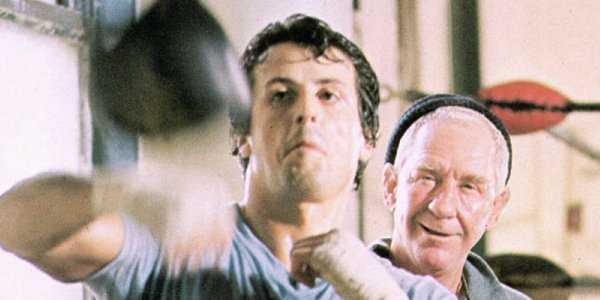
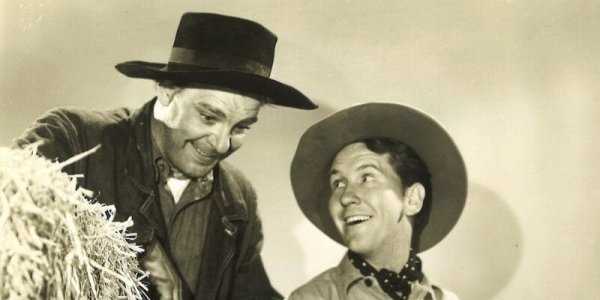
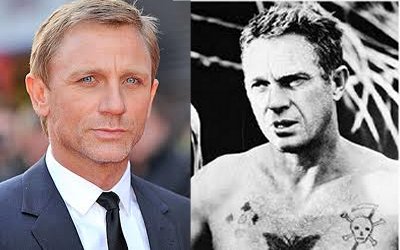
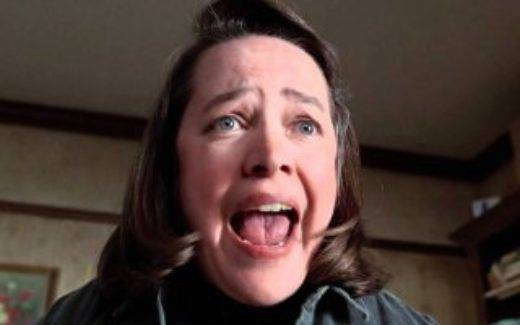
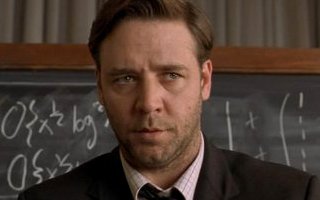




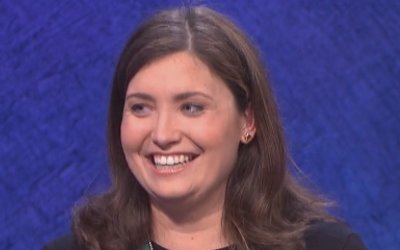
Recent Comments